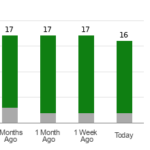The automotive industry is currently in the midst of a metamorphosis, with hybrid and electric vehicles (EVs) spearheading the revolution. Global EV sales surged by 21% in the first quarter of 2024, fueled by escalating consumer demand, government incentives, and the introduction of more affordable models by major automakers. In this landscape, Stellantis (STLA), the automotive behemoth resulting from the fusion of Fiat Chrysler Automobiles and Groupe PSA, stands out as a forerunner, strategically positioning itself to harness the industry’s evolution.
Highlighted during its 2024 Investor Day on June 13, Stellantis showcased its unique standing among the former Detroit “Big Three” giants. CEO Carlos Tavares delineated nine pivotal strategic advantages that allow the company to unlock value and confront industry challenges with dexterity.
Bank of America (BofA) has tipped Stellantis to outperform its Big 3 rivals – General Motors (GM), Ford (F), and hybrid heavyweight Toyota (TM). Analysts foresee significant benefits for Stellantis from its diverse brand portfolio and steadfast commitment to electrification.
With a consensus “moderate buy” rating on Wall Street and a projected 47% upside to the mean price target, Stellantis emerges as a compelling investment prospect in the swiftly evolving automotive panorama. Can STLA meet analysts’ projections and lead the automotive sector through its electrification revolution? Let’s delve deeper.
Examining Stellantis’ Financial Performance
Stellantis N.V. (STLA) commands a dominant position in the auto industry, boasting a formidable array of 14 iconic car brands such as Jeep, Ram, Peugeot, and Maserati. This diversity lends the company unparalleled adaptability to cater to various global markets and consumer preferences.
An advantage for Stellantis lies in its reduced dependence on the Chinese market, a vulnerability faced by some automakers owing to escalating trade tensions and mounting competition from local players. Instead, Stellantis concentrates on established markets like North America, Europe, and emerging regions such as South America, the Middle East, and Africa.
Despite experiencing notable volatility in its stock price in recent months, Stellantis exhibits resilience. While the stock saw a 30% pullback from its peak in March, it maintains a 21% increase over the last 52 weeks despite being down 12% YTD.

Trading at a significantly low price/earnings ratio of around 3.69 compared to other automakers, Stellantis reflects an undervalued stock. Furthermore, its enticing 8% dividend yield remains appealing for income-seeking investors. Bolstering its position is a robust balance sheet, flaunting a substantial cash reserve exceeding €47 billion.
Through strategic cash management, Stellantis aims to reduce liquidity to 25-30% of revenue over time, potentially paving the way for share buybacks or strategic investments. Earlier in 2024, Stellantis unveiled a €3 billion share buyback scheme, part of its broader strategy to return over €7.7 billion to shareholders through dividends and buybacks this year.
Despite recent stock price fluctuations, Stellantis has showcased commendable financial performance. In its latest earnings report for 2H 2023, the company unveiled an EPS of $2.99 and revenues of $97.8 billion, slightly below expectations. However, maintaining a double-digit adjusted operating income margin underscores Stellantis’ commitment to robust financial fortitude even amidst uncertainties.
Proactively managing its inventory and readying for a wave of new product launches in the latter half of 2024, Stellantis anticipates growth and profitability. The commercial vehicle segment remains sturdy, securing market share dominance in regions like the Middle East & Africa, while sustaining leadership in Europe and South America. Notably, EV sales display robust growth, with North American PHEV sales soaring by 79% year-over-year.
The Key Drivers of Stellantis’ Triumph
Stellantis is orchestrating strategic maneuvers to maintain a competitive edge in the fierce automotive arena. Noteworthy among these initiatives is the relocation of some EV production from China to Europe. This tactical shift aims to sidestep potential EU tariffs, ensuring competitive pricing and diminished operational expenses. By manufacturing in the European market, Stellantis aligns better with regional regulations and consumer preferences, potentially amplifying its market share in the expanding EV segment.
Another pivotal development is Stellantis’ recent recall of approximately 200,000 Dodge SUVs and Ram trucks due to stability control issues. While recalls initially tarnish a company’s reputation and stock value, Stellantis’ proactive stance in addressing these safety concerns bolsters long-term customer trust and loyalty. Swift resolution of such issues underscores the company’s commitment to quality and safety, pivotal for preserving consumer confidence.
In addition, Stellantis is enhancing its electric vehicle charging infrastructure in North America through the adoption of the proposed SAE J3400 connector. Commencing with select models in 2025, this drive will elevate the charging ecosystem for Stellantis’ battery-electric vehicles (BEVs). The collaborative effort to install at least 30,000 high-powered charging points by 2030 underscores Stellantis’ dedication to supporting its EV clientele and fostering sustainable mobility. This initiative not only enhances the customer journey but also situates Stellantis as a forward-thinking trailblazer in the EV domain.
Analysts’ Perspectives on Stellantis Stock
Analysts exhibit optimism towards Stellantis stock. While the company isn’t anticipated to deliver EPS growth until fiscal year 2025, the prevailing consensus rating on Wall Street remains a “moderate buy.”
Out of 17 analysts offering recommendations, 10 advocate a “strong buy,” 2 favor a “moderate buy,” 4 suggest “hold,” and only 1 recommends a “strong sell.” The mean price target stands at $30.13, implying a substantial 47% upswing from the recent closing price.

As the automotive realm undergoes rapid evolution, Stellantis emerges as a frontrunner. Fortified by a robust model pipeline, substantial liquidity, and strategic synergies, the company is primed to outshine its Big 3 competitors from the US, as well as rivals from Japan and Germany, in the forthcoming years.





